
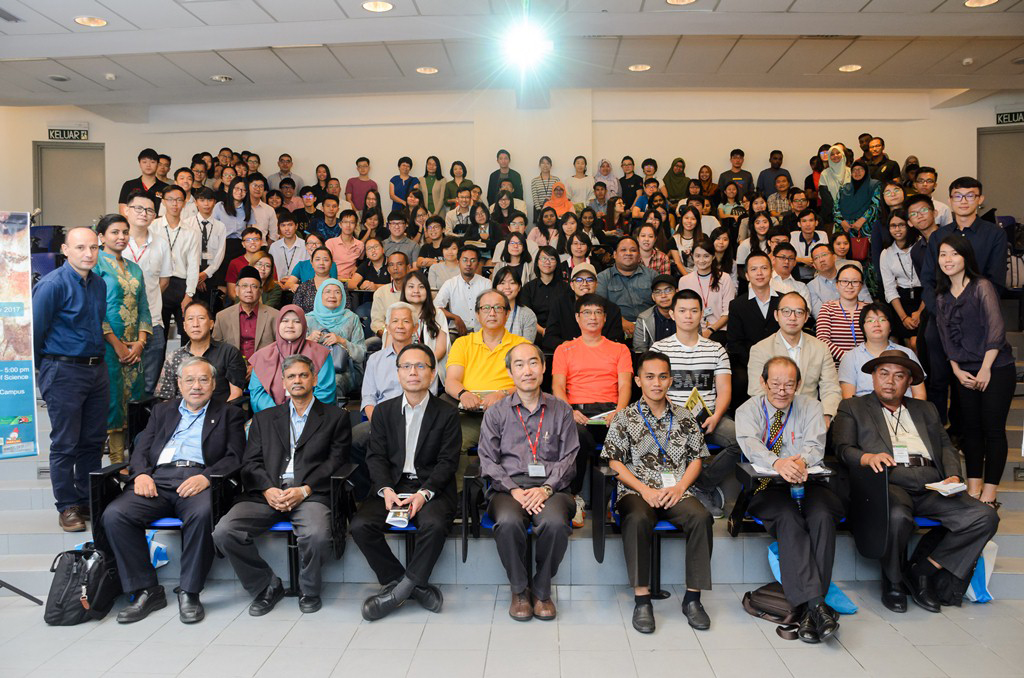
Group photo of the organising committee, speakers and participants
The 16th Series of the Agriculture Technology Seminar was jointly organised by UTAR Centre for Bio-Diversity Research, Faculty of Science (FSc) and the Institute of Postgraduate Studies and Research (IPSR) at Kampar Campus on 25 November 2017.
Held bi-annually, the seminar this time was themed ‘Livestock farming: Sustainability and productivity’ which saw the presence of six experts with diverse experiences related to Malaysian livestock, namely Malaysian Agricultural Research and Development Institute (MARDI) Animal Science Research Centre Director Dr Shanmugavelu Sithambaram, Semosa Sdn Bhd (Penternakan) Director Haji Mohd Nasir bin Haji Samat, Universiti Sultan Zainal Abidin (UniSZA) Faculty of Bioresources and Food Industry’s Prof Dr Ramli bin Abdullah, Malaysian Association Food Animal Veterinarian (MAFAV) President Dato’ Dr Vincent Ng In Hooi, Department of Veterinary Services (DVS) Perak (Jabatan Perkhidmatan Veterinar Perak) Veterinary Officer Dr Norsuhanna binti Mohd Mokhtar, and Myternak Trading Veterinary Supplies & Services Manager Dr Fakar Fariz Abd Wahab.
“In conjunction with the addition of the Animal Science option under the degree of Bachelor of Science (Hons) Agricultural Science since October 2015, it’s a good opportunity to hold this seminar with the theme focusing on livestock farming to introduce the degree programme and to edify the students and public with knowledge of Malaysia’s livestock industry from the aspects of sustainability and productivity,” said Organising Chairperson Dr Kwong Phek Jin to the 140-strong crowd comprising the public, UTAR staff and students.
Thanking the organising committee for the invitation, UTAR Vice President for R&D and Commercialisation Prof Ir Dr Lee Sze Wei applauded the effort to highlight the importance of pursuing and re-designing Malaysia’s livestock farming sustainably, thus benefitting to the people and the environment. “As our country imports meat product and also raw ingredients of animal feed such as corn, we need to understand that there will be a day when the animal protein industry will face a big challenge if the global supply of corn reduces. Therefore, R&D in using alternative raw ingredients available in our own country is important for long-term sustainability,” explained Prof Lee.
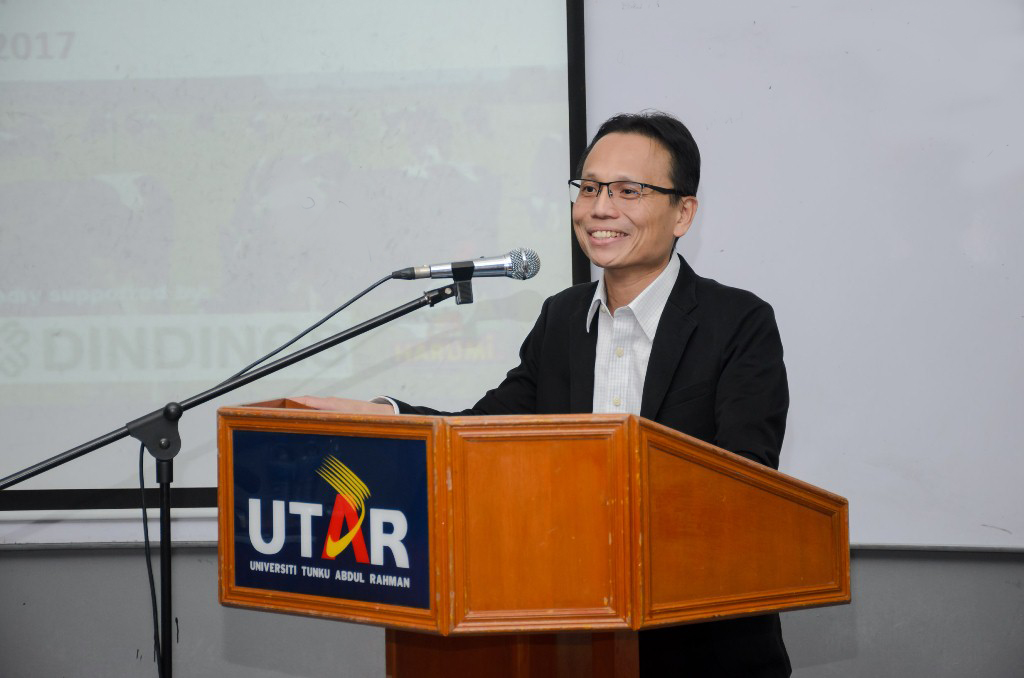
Prof Lee
Dr Shanmugavelu’s “Sustainability and Productivity of the Poultry Industry” first addressed issues related to the profitability in the ruminant sub-sector to create awareness of the current situation in different livestock industry subsectors. “There’s a clear dichotomy between the ruminant and non-ruminant sub-sectors in Malaysia. The non-ruminant sub-sector contributes to over 90% of the ex-farm produce valued at RM19billion. At present, poultry meat is the most consumed and cheapest source of protein in the country,” he told, as he briefly highlighted the development of the poultry industry with focus on broilers (meat) industry and its sustainability following domestic and global demands as well as price competitiveness. The award-winning researcher also shed light on factors critical to Malaysia’s sustainability in the poultry industry, especially in terms of feed resources and strategies undertaken.
In “Livestock Farming Success Recipe (Resepi Kejayaan dalam Bidang Penternakan)”, Nasir shared with the audience the many uphill tasks faced and the strategies employed in coping with those challenges. “Among the past challenges I faced were diseases such as the foot-and-mouth disease, lack of manpower, difficulty in hiring foreign workers, financial difficulties and others,” revealed the seasoned breeder who also shared his secrets to success which ultimately earned him awards in flock competitions. “Remember that one should always have patience and be in high spirits when going through the multiple challenges and obstacles,” he advised.
Presenting the challenges faced by the goat dairy industry was Prof Ramli’s “Capacity and Productivity of Dairy Goat Industry in Malaysia”. “The challenges are often not limited to local dairy goat breed, dairy goat nutrient, dairy goat farm management practices, dairy goat farm workers’ use of appropriate innovation and technologies, industrial investment and marketing mechanism,” mentioned the researcher while sharing his fervent hope that a concerted effort must be taken into serious consideration to strengthen Malaysia’s goat dairy industry, including goat dairy entrepreneurship. “This is also to ensure that the wellbeing of the entrepreneurs and the consumers are taken care of in order to increase their socio-economy as well as the food security and safety,” he added.
Dato’ Ng explained to the audience the factors affecting animal health in his presentation titled “The Importance of Disease Control towards the Productivity and Sustainability of Poultry Production in Malaysia”. “These factors include system of management, housing, feeding, genetics, hygiene, vaccination programme, medication, climate and welfare concerned in animal production,” revealed the MAFAV President who also stressed the importance of effective Poultry Health Management as it not only identifies risks related to animal health, but also effectively prioritises these risks and strategises ways to reduce and eliminate inefficiencies. According to Dato’ Ng, when such management is in place, then the chances of diseases happening will be lower, thus resulting in healthier animals ensuring safer food supplies, higher farm productivity, and reduced use of antibiotics.
“Livestock Farming: Sustainability and Productivity from DVS Perak’s Point of View” by Dr Norsuhanna elaborated the six key areas crucial to the increase of productivity and sustainability, namely good management of animal feeds; improvement of quality and quantity of livestock breeding via management and application of technology; livestock health, sanitisation and farm biosecurity management; prevention of antimicrobial resistance; animal welfare management; and livestock farming with public and environmental-friendly concept. She also proceeded to introduce the strategies undertaken by DVS Perak in ensuring the development and continuity of Perak’s livestock industry. “Livestock farming needs to be carried out responsibly and systematically to ensure the industry’s sustainability and productivity,” the officer reminded.
The sixth speaker’s “Producing Quality and Easy Bran for Breeders Using DIY Feed for Poultry and Ruminants” introduced the two types of DIY Feed for poultry, namely DIY Broiler which is for broiler chickens and DIY Layer for laying hens. “It is encouraged to make your own bran mixture in order to save cost. The basic bran mixture uses premix (DIY Feed), Grades C and D corn, soybean meal, wheat, premium palm kernel cake (Purafex). Rice bran or any other ingredients easily available around your area can also be added in,” revealed Dr Fakar, who also added that the use of premix is to complement other nutrition which is lacking.
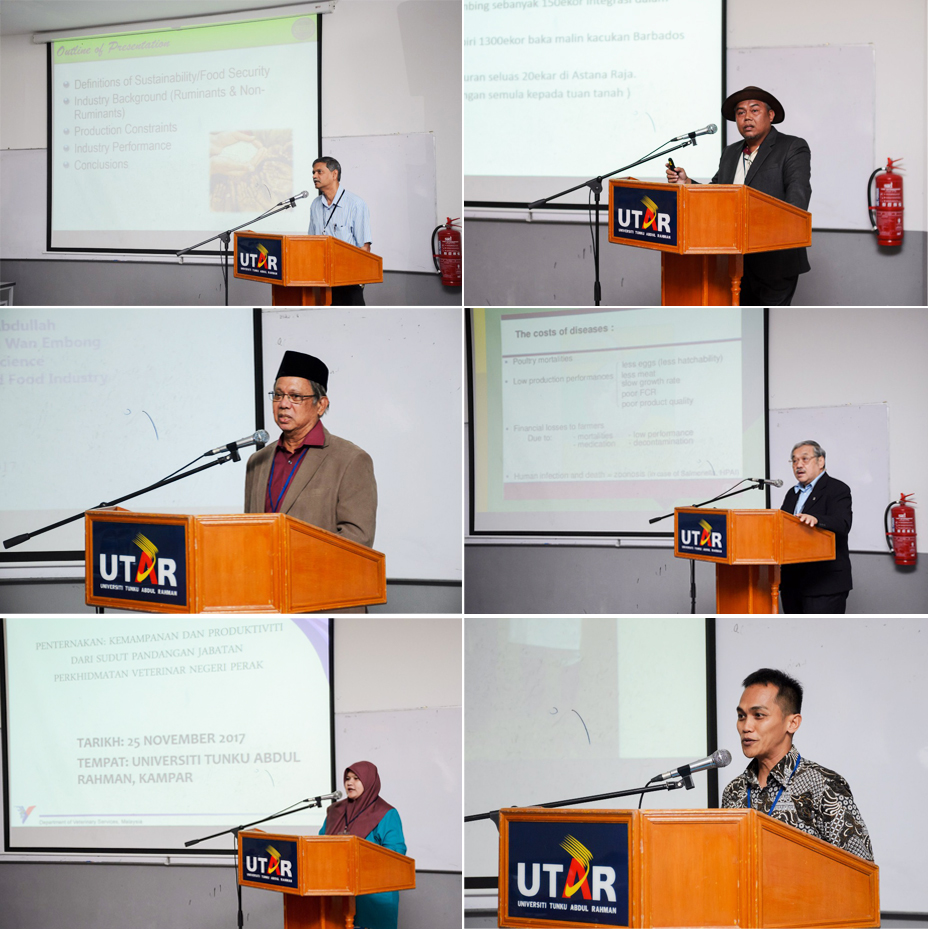
Clockwise from top left: Dr Shanmugavelu, Nasir, Dato’ Ng, Dr Fakar, Dr Norsuhanna and Prof Ramli
The seminar also saw a demonstration session by Dr Fakar’s team on the mixture of agriculture by-product such as rice bran, PKC, corn and DIY feed premix at the recommended ration for either ruminants or poultry in which farmers can easily prepare the feed for animals on their own.
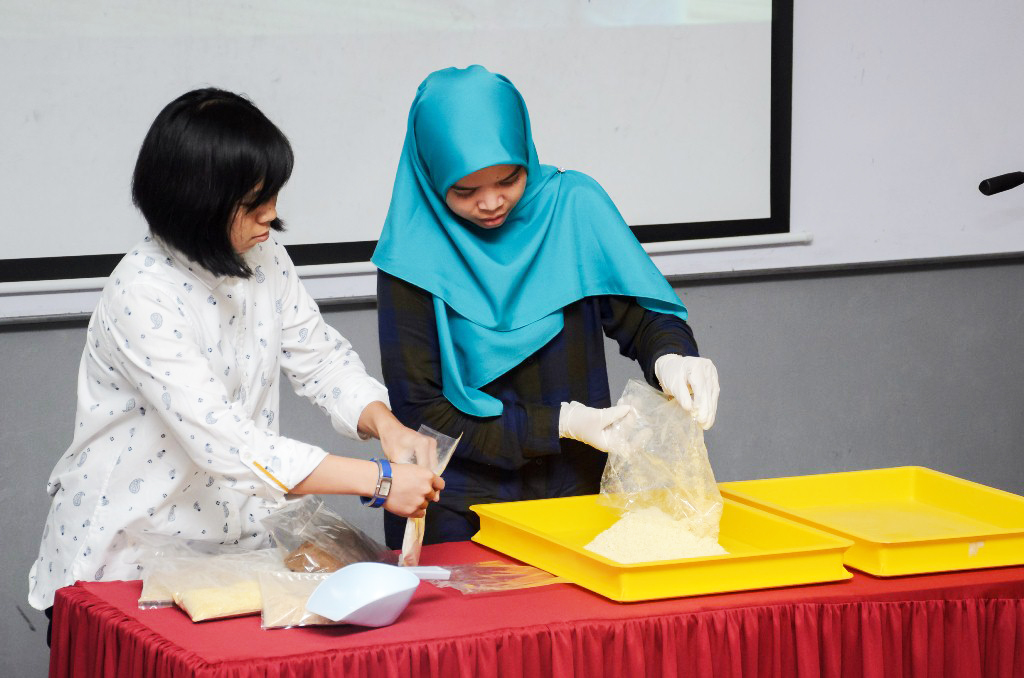
Demonstration by Dr Fakar’s team
Delivering the closing remark was Dr Lim who said that UTAR as a university by the people for the people, welcomes those interested to co-organise workshops for the benefit of the public and the students. “I believe that the one-day seminar’s theme is important and interesting as our source of protein relies heavily on the success of livestock farming. I must congratulate the organising committee for successfully presenting a continuation of the seminar series,” concluded the FSc Dean who also thanked the speakers, moderators and sponsors for their unwavering support.
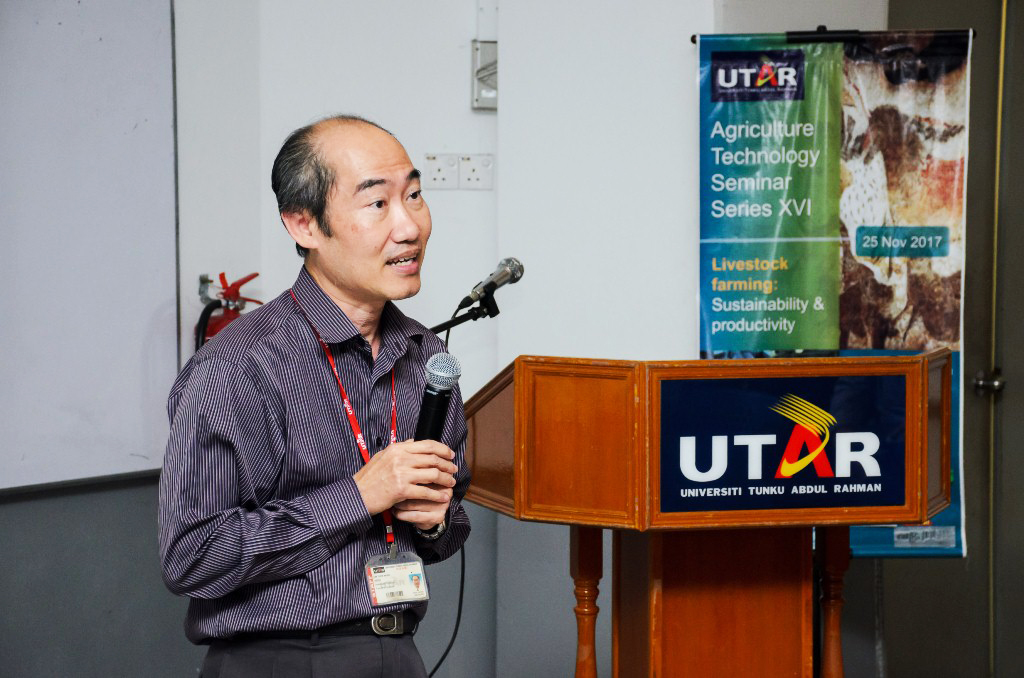
Dr Lim expressing his gratitude to the organising committee, speakers, moderators and sponsors
The seminar is supported by Dindings Poultry Development Centre Sdn Bhd, HARUMi Restaurant and Gaia Science (M) Sdn Bhd.
© 2019 UNIVERSITI TUNKU ABDUL RAHMAN DU012(A).
Wholly owned by UTAR Education Foundation Co. No. 578227-M LEGAL STATEMENT TERM OF USAGE PRIVACY NOTICE